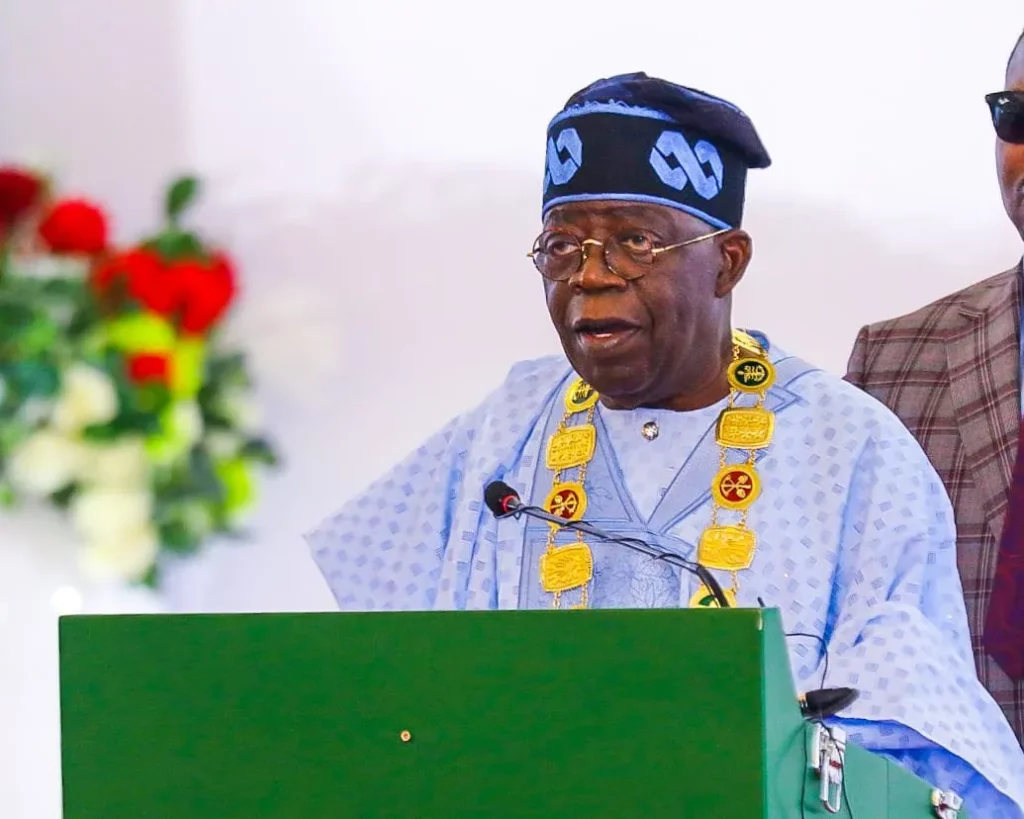By Abdulkarim Ibrahim
In a fiery address at the APC’s National Executive Committee (NEC) meeting in Abuja, President Bola Tinubu unleashed a scathing remark at the Peoples Democratic Party (PDP) and the African Democratic Congress (ADC). With his signature charm and wit, Tinubu urged politicians to jump ship and join the ruling All Progressives Congress (APC), implying that the opposition parties are doomed to fail.
Tinubu’s words were laced with sarcasm as he referred to the PDP and ADC as a “sinking ship” and a “coalition of confusion.” This biting critique was not just a jab at the opposition but also an invitation to politicians looking for a winning team. By emphasizing that there’s still room for defectors in the APC, Tinubu is signaling that the party is open for business and ready to welcome new members.
As the APC continues to attract new members, Tinubu’s bold move is likely to send shockwaves through the political landscape. With elections looming, the APC’s growth and Tinubu’s leadership style will be under intense scrutiny. Will his strategy pay off, or will the opposition parties find a way to rebound? Only time will tell, but one thing is certain – Tinubu is not holding back in his quest to solidify the APC’s position as the dominant force in Nigerian politics.
“It’s not a bad idea to abandon as inking ship and be absent from a coalition of confusion,” Tinubu said.
President Bola Tinubu extended a warm welcome to two notable defectors from the Peoples Democratic Party (PDP) – Governor Sheriff Oborevwori of Delta State and Governor Eno Umo of Akwa Ibom State – who have recently joined the All Progressives Congress (APC).
The President’s gesture was not just a courtesy but also a strategic move to strengthen the party’s ranks. By embracing these high-profile defectors, Tinubu is signaling that the APC is a welcoming and inclusive platform for politicians from other parties.
Tinubu urged APC members to be open and receptive to more opposition politicians who may be willing to join the party. This call to action underscores the President’s vision for a growing and dynamic APC that can attract fresh talent and ideas from across the political spectrum.
“With the space that we have created to allow aspiring people to join us, our doors are still open and we should embrace them wholeheartedly,” the president said.
With the defection of governors Eno and Oborevwori, the APC now has 23 governors.
Also, four senators—two each from Akwa Ibom and Osun states—formally announced their defection during Senate plenary on Wednesday. The Senators are Sampson Ekong (Akwa Ibom South), Aniekan Bassey (Akwa Ibom North-East), Francis Fadahunsi (Osun East), and Olubiyi Fadeyi (Osun Central).
With this development, the All ProgresSsives Congress (APC) has significantly bolstered its position in the Senate with the latest development. The party’s strength has increased to 70 seats out of 109, putting it within striking distance of achieving a two-thirds majority.
The APC is now just two seats shy of the 72 required for a two-thirds majority, a milestone that would grant the party significant legislative power. This development underscores the APC’s growing dominance in the Senate.
The current Senate composition stands as follows: APC with 70 seats, PDP with 28 seats, Labour Party with 5 seats, SDP with 2 seats, and NNPP and APGA with 1 seat each. This shift in numbers may have implications for the balance of power and the passage of future legislation.
The All Progressives Congress (APC) has catapulted itself to the pinnacle of power in the Senate, boasting an impressive 70 seats out of 109. This monumental milestone puts the party a hair’s breadth away from achieving the coveted two-thirds majority, a feat that would grant them unparalleled legislative clout.
With a mere two seats separating them from the magic number of 72, the APC is poised to flex its muscles and shape the country’s legislative agenda. This development is a testament to the party’s growing strength and influence in the Senate, and its ability to push through key bills and policies.
As the numbers currently stand, the APC’s dominance is clear: 70 seats for the ruling party, 28 for the PDP, 5 for the Labour Party, 2 for the SDP, and 1 each for the NNPP and APGA. With this commanding lead, the APC is set to dictate the pace of legislative business, leaving its opponents to play catch-up.
